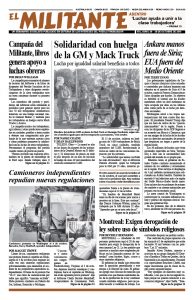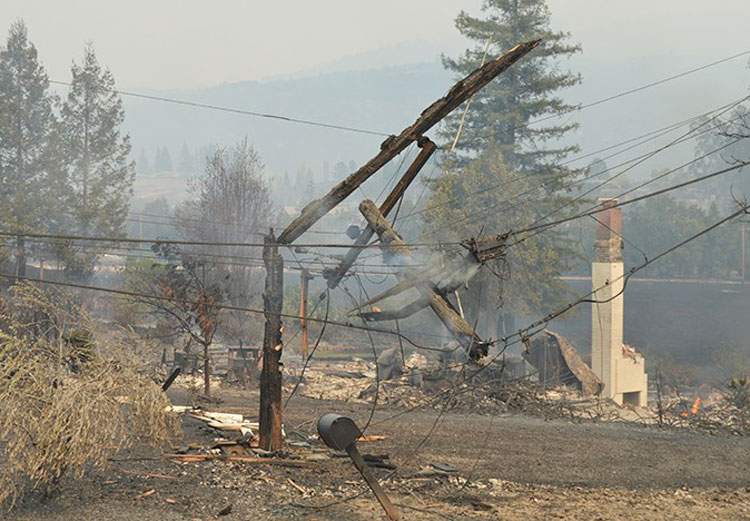OAKLAND, Calif. — “It’s outrageous what PG&E is doing,” Crystal Perdiguerra, a resident of East Oakland whose husband uses a home dialysis machine, told the Militant.
Perdiguerra, like many others, is angry at the disdain shown by Pacific Gas & Electric bosses when they upended the lives of millions in Northern California by shutting off power to over 700,000 homes and businesses Oct. 9. Company officials claim this was necessary to prevent possible wildfires.
PG&E is a mammoth power monopoly that supplies gas and electric services to roughly one in 20 people in the U.S.
Because of a breakdown in PG&E’s warning system and website, millions of people in the targeted 34 counties did not know when, or if, their electricity would suddenly disappear.
Worried about the power going off unexpectedly when her husband was on the dialysis machine, Perdiguerra, a hospital maintenance engineer, repeatedly tried to reach PG&E. All she got was a useless recording.
Her neighbor, Brandy Swisher, a home care worker with patients whose survival depends on electrically powered medical equipment, was equally outraged. “A lot of people need this power,” she said, “including newborns.”
PG&E has a long record of failure to maintain its infrastructure. Its lines and other equipment have ignited a multitude of wildfires, including the notorious Camp Fire last year that wiped out the town of Paradise, killing 85.
They admit that so far this year they have removed fewer than 40% of the 50,000 dead or dying trees that are threatening to fall on live wires. Instead, the utility bosses’ answer is to shut off electricity whenever high winds pick up.
Opposition exploded as the shutdown unfolded over the past week. Staffs at nursing homes and other critical services scrambled to find generators. Schools, clinics and businesses lost power and traffic signals and lights ceased to function.
People were left to fend for themselves. Repeated announcements were made urging everyone to stock candles, flashlights, canned food, water and other necessities, which quickly disappeared from store shelves. Food stored in refrigerators and freezers went bad.
The pushback was so strong that CEO Bill Johnson, whose annual base salary is $2.5 million, plus return on his PG&E shares, had to apologize for what he called “inconsistent” and at times “incorrect” information about the shutoff from the company.
While refusing to invest in what is needed for basic safety, those running PG&E have spent billions on executive salaries, dividends to shareholders and contributions to pliant capitalist politicians.
Meanwhile, PG&E is in bankruptcy court, owing some $30 billion to settle lawsuits from fires caused by the bosses’ neglect. Hedge fund profiteers and shareholders like Johnson are vying for the right to control the utility, hoping to wring out more profits.
‘Workers’ control over PG&E’
“They don’t care about us. All they care about is the money they make for themselves,” Angel Lozano, a worker at an auto body shop, told Joel Britton, Socialist Workers Party candidate for mayor of San Francisco, while he and supporters were campaigning door to door in San Jose.
“Take the profits out of this service that millions depend on,” Britton said. “We should nationalize the company under the control of the workers.”
“We can take steps today that will make changes such as this possible,” Britton said, “by supporting workers’ struggles like the GM strike and building a stronger union movement.
“The capitalist politicians of both parties have made it possible for PG&E to get away with its criminal activities,” Britton said. “We need to stop supporting these parties and create a movement of millions that can replace capitalist rule with a workers and farmers government.”
As a former process operator in an oil refinery and member of the Oil, Chemical and Atomic Workers union, Britton said that he learned firsthand the importance of union struggles for safe working conditions that can protect against explosions, fires and other disasters.
“PG&E workers, most of whom are members of the International Brotherhood of Electrical Workers, need to be in control of operations of this utility,” Britton said. “They know from their own experiences what is safe and what is dangerously unsafe.”


